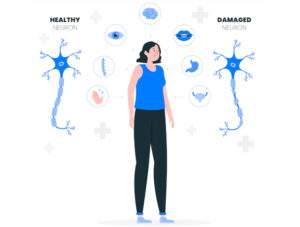Neuropathic pain, also known as nerve pain or neuropathy, is a type of chronic pain that occurs as a result of damage or dysfunction in the nervous system, specifically the central or peripheral nervous system. Before we dive in, please know that I am not a medical professional and what follows is not medical advice. I enjoy researching such topics and presenting information that may interest you.

Image by storyset on Freepik
In a nutshell, the central nervous system (CNS) comprises the brain and spinal cord and is responsible for processing information and coordinating bodily functions. The peripheral nervous system consists of nerves outside the CNS and connects the CNS to the rest of the body, relaying sensory information and motor commands. Unlike nociceptive pain, which is caused by the activation of pain receptors in response to tissue damage or inflammation, neuropathic pain is often caused by abnormalities in the nervous system itself.
Neuropathic pain can be felt in various ways, such as:
- Burning Sensation: Patients may experience a burning or electric shock-like sensation in the affected area.
- Numbness and Tingling: There might be feelings of numbness, tingling, or “pins and needles” in the affected region.
- Hypersensitivity: Normal stimuli, such as light touch or mild pressure, can trigger intense pain.
- Shooting or Stabbing Pain: Some individuals experience sharp, shooting, or stabbing pains.
- Continuous Pain: The pain can be constant and persistent, often not responding well to traditional pain relievers.
Neuropathic pain can result from various underlying conditions and causes, including:
- Diabetes: Diabetic neuropathy is a common cause of neuropathic pain, where high blood sugar levels damage nerves over time.
- Nerve Compression: Conditions like herniated discs or carpal tunnel syndrome can compress nerves, leading to neuropathic pain.
- Infections: Certain infections, like shingles (herpes zoster), can damage nerves and cause lasting pain.
- Trauma: Injuries to nerves can lead to neuropathic pain, even after the injury has healed.
- Neurological Diseases: Conditions like multiple sclerosis and certain types of neuropathy can cause neuropathic pain.
- Chemotherapy: Some cancer treatments, particularly chemotherapy drugs, can damage nerves and cause neuropathic pain.
- Toxins: Exposure to certain toxins, such as heavy metals, can damage nerves and lead to neuropathy.

Managing neuropathic pain can be challenging. Treatment approaches might include medications that target nerve pain (like anticonvulsants, antidepressants, and certain pain relievers), physical therapy, nerve blocks, and lifestyle adjustments. It is important to work closely with a healthcare professional to determine the best approach for managing neuropathic pain based on the underlying cause and individual patient needs.
To Your Success & Freedom,
Glenn Shimabukuro



